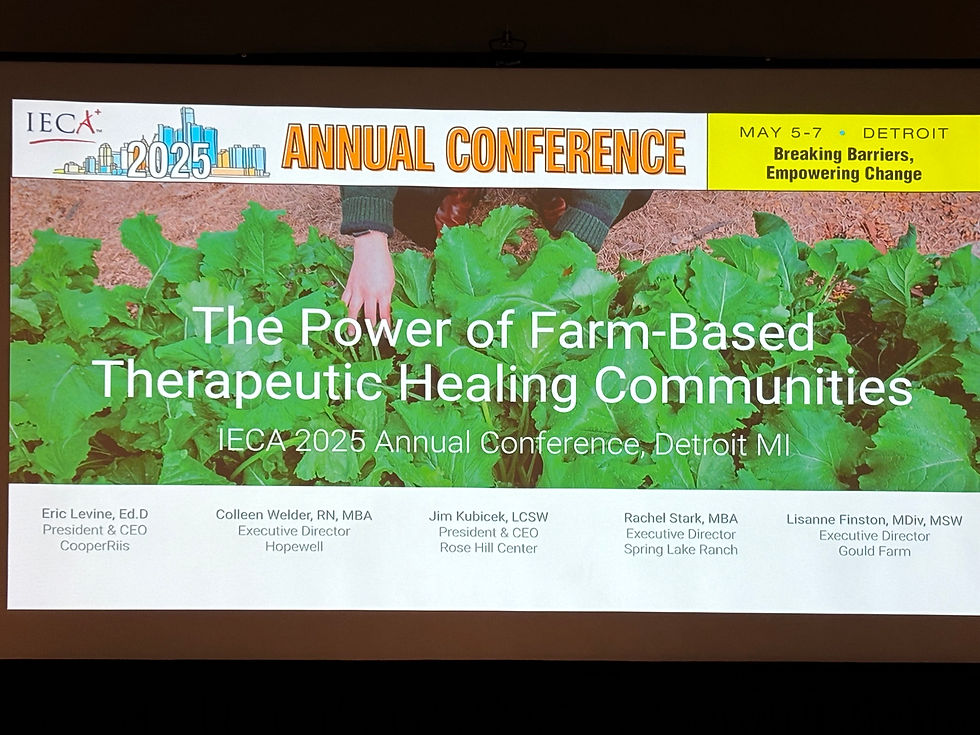Reflections from IECA 2025
- Gould Farm

- May 20, 2025
- 3 min read

In early May 2025, five of the nation’s leading farm-based therapeutic communities—Gould Farm, Spring Lake Ranch, Hopewell, Rose Hill Center, and CooperRiis Healing Community—came together for a landmark presentation at the Independent Educational Consultants Association (IECA) Annual Conference in Detroit. For the first time, our organizations united to present a shared vision of healing through nature, work, and community.
The session, titled “The Power of Farm-Based Therapeutic Healing Communities,” highlighted the strengths of our collaborative model and our collective mission: to support adults living with serious mental illness through structured community living, meaningful work, and clinical care grounded in compassion and respect. Each of our programs may look different—from forests to fields, mountains to meadows—but we share a core belief: that healing is possible when adults with mental illness are met with purpose, belonging, and care.

Download the presentation slides here:
Honoring History, Embracing Innovation
Our presentation began by grounding attendees in the roots of our work. Drawing on the legacy of the moral treatment movement of the 18th and 19th centuries, we revisited a time when kindness, routine, and nature were revolutionary responses to mental illness. Today, our communities carry that legacy forward in modern ways—integrating evidence-based therapies with person-centered environments that prioritize dignity, routine, and human connection.
We spoke to how farm-based communities are uniquely equipped to serve individuals with diagnoses including schizophrenia, bipolar disorder, major depression, psychosis, and co-occurring challenges such as OCD or secondary substance use. Admission to these communities is carefully considered to ensure the safety and readiness of each participant, supporting recovery with structure, autonomy, and skill-building.
Nature Heals, Work Grounds, Community Connects
Three themes echoed throughout the session:
Nature as a therapeutic force – Each campus offers immersive environments that foster mindfulness, lower stress, and invite quiet reflection. Whether through forests, fields, or gardens, nature helps individuals reconnect to self and surroundings.
Work as a healing practice – From animal care and woodworking to gardening and meal preparation, purposeful work reinforces confidence, routine, and interdependence.
Community as recovery’s foundation – Through shared meals, chores, rituals, and relationships, our communities cultivate stability, belonging, and identity. Participants are not isolated clients—they are neighbors, co-workers, and contributors.
These pillars don’t replace clinical care—they complement it. Across our programs, participants also engage in psychiatry, group therapy, life skills training, relapse prevention, and peer support. This integrated model supports long-term recovery, with many residents continuing to live independently, volunteer, work, or attend school after discharge.
A Glimpse Into Outcomes
The presentation also offered a look into internal outcomes data gathered from program alumni. The results were deeply affirming:
82% of respondents reported being engaged in employment, volunteering, or education 6 months post-discharge.
Most had maintained recovery goals, remained in supportive housing, and stayed connected to ongoing care.
Participants spoke of a renewed sense of self, improved coping strategies, and increased motivation to avoid self-harming behaviors.
One participant simply said, “It was a second chance.”
"Driven to Heal": Connection Beyond the Conference
Our time in Detroit extended beyond the conference room. Together, we co-hosted a special evening event—"Driven to Heal"—at the historic Ford Piquette Avenue Plant, a space symbolic of innovation and progress. More than 100 guests gathered to celebrate this unique model of care, share stories, and strengthen the web of professionals who support individuals on their mental health journeys.

In addition, all five executive directors toured Rose Hill Center’s campus in Michigan, experiencing firsthand the beauty and depth of another healing community. These moments of connection reminded us: we are not only peers, but partners. We walk alongside each other—just as we do with those we serve.
Looking Ahead
Our shared hope is that this collaborative moment at IECA 2025 sparks deeper understanding of and appreciation for the therapeutic farm model. For educational and therapeutic consultants, these communities represent a vital option for adults needing a thoughtful, person-centered path toward recovery. For families, they offer hope rooted in tangible outcomes and grounded in human dignity.
As we continue to deepen this collaboration, we remain committed to honoring the uniqueness of each program while lifting the common thread that binds us: the belief that healing happens in community.




Comments